Argentina - An Oral Health Preventive Programme for School Children
Argentina - An Oral Health Preventive Programme for School Children
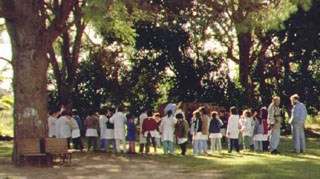
Oral health preventive programme in the outdoors.
Introduction
This oral health preventive programme was initiated and implemented by a group of volunteer dentists from 1994 to 1998 in Santa Fe, Argentina. The following participated and contributed for the success of this project. Programme Assessor: Dr. Hugo Rossetti. Co-ordinator: Dr. Marcelo Prósperi. Members: Dr. Fabio Botta, Dra. Ma. Victoria García, Dra. Ma. Laura García Puente, Dra. Susana Mora, Dra. Valeria Nepote, Dr. Víctor Pipino, Dr. Jorge Rodríguez Zía, Dra. Marta Scavuzzo, Dra. Lorena Spiler, Dr. Simón Spiler, Dra. María Rosa Perales.
We thank the above group for providing us the main project outcome, which we have summarised here.
Background and Rationale
Extensive clinical work and field experience in different parts of Argentina highlighted the need for the dentists to bring about preventive oral health approach instead of only concentrating on pure treatment methods. The school seemed to be the best place to introduce oral health education and prevention as teachers can be trained to impart these measures to the children.
Programme Outline
Objectives:
- To introduce school age children to the dentist.
- To obtain a good dentist-patient relationship, working with oral health education within an ideal medium: the school.
- To integrate all the school staff to the project.
- Topical fluoride applications to be performed by one or two dentists for all the children.
- To obtain general oral health improvement and at a low cost.
- To carry out health actions to be reproduced on different needy areas in the Province.
Four different types of schools were selected, with a total of around 600 children, 42 teachers and one health officer. The schools selected were those with public canteens where the government provided a meal, where social attention were needed and had no previous medical care:
- A school for the hearing impaired (deaf) located in the city where though communication was the principle difficulty the teacher/children relationship was closer.
- A school near a shanty town from a poor area.
- Two schools from native communities.
Health programme
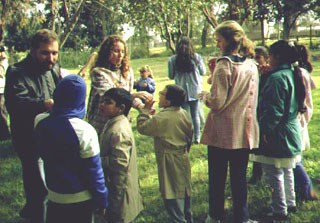
Tooth brushing supervised by teachers.
The four year project commenced in October 1994 and ended in November 1998. First, the project staff met with the school staff and discussed and explained the programme. Teachers were instructed on oral health measures and tooth brushing techniques. The teachers then conveyed this to the children using their communication skills and strategy effectively. Toothbrushes were distributed to the children and under the supervision of a dentist and a teacher the children brushed their teeth daily in the school.
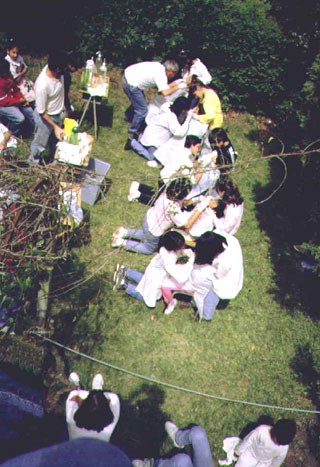
Topical application of fluorides.
Once a month also under supervision, the children applied Fluoride phosphate to their teeth. Fissure sealants were placed by two dentists to all the children after 2 months of the commencement of the project. If tooth extractions were indicated the children were referred to the nearest medical centres. Presence of caries were noted in the beginning and in the end of the programme after 4 years. The DMFT of 12-13 year olds in the programme was compared with a control group of the same age from other schools.
Is the programme a success?
After 4 years of the oral health programme, the DMFT of the 12-13 year olds in the project was 1.26 and the DMFT of the control group was 3.05. 46% of the 12-13 year olds in the project were caries free when compared to the control group where 34% were caries free. Only 15% of the project group were caries free in the beginning of the programme.
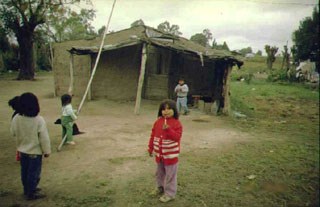
"Its good to brush your teeth."
It was proven that it was possible to develop an oral health preventive field programme. Success on school based programmes depended on teacher participation. A nearly 50% reduction of caries was observed at the end of the programme.
Challenges
As majority of the children especially those attending the 2 native schools and in the shanty town were in need of food, poor health and education introducing this programme based on improving oral health was challenging. However over a period of time attitudes changed and a positive relationship established between the children and the dentists.
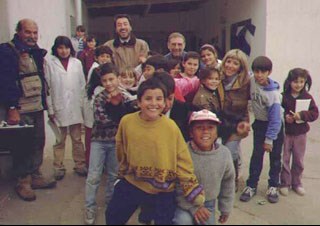
Participating native indian children.
A serious drawback was the continuous transfer of teachers from deprived zones to better places. Monthly meetings where experiences were shared so as to support each other and go on working. The freedom of voluntary work without other pressures was very welcome.
